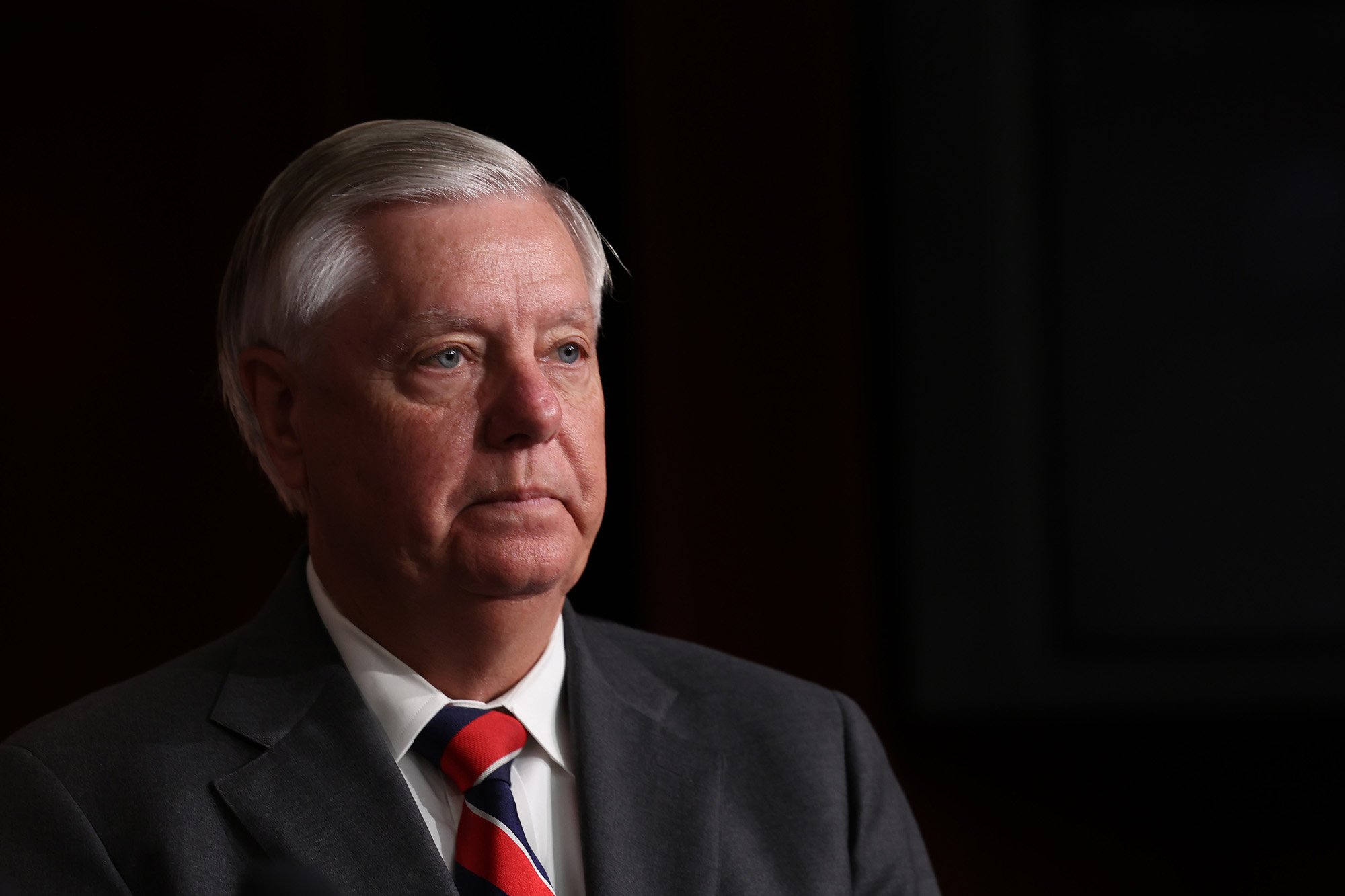US blocking aid to Ukraine: Trump's influence and Biden's stalemate
 Joe Biden, Volodymyr Zelenskyy, Donald Trump (RBC-Ukraine collage)
Joe Biden, Volodymyr Zelenskyy, Donald Trump (RBC-Ukraine collage)
The abrupt halt in aid allocations to Ukraine by Republicans has sparked questions regarding the roles of former President Donald Trump and House Speaker Mike Johnson. Additionally, President Joe Biden's unwillingness to compromise with opponents has further complicated the situation. Detailed insights are provided in an exclusive report by RBC-Ukraine.
Sources used in preparation of the article: POLITICO, PBS, Bloomberg, Forbes, and reports from analytical centers like GIS, alongside data from social surveys conducted by the Pew Research Center and the Kiel Institute for the World Economy, public statements by Senator Lindsey Graham and other American politicians
Last week, Kyiv played host to two high-profile visitors from the United States. President Joe Biden's delegation was led by his national security advisor, Jake Sullivan, while the camp of his chief opponent, Donald Trump, was represented by influential Republican Senator Lindsey Graham.
Despite stylistic differences in their statements, the essence remained strikingly similar: assurances of continued support for Ukraine in its struggle against Russian aggression, compliments to the Ukrainian army and people, yet a glaring lack of specificity regarding tangible aid for Ukraine as it enters its third year of full-scale war, leaving its prospects shrouded in uncertainty.
'America's own problems'
Undoubtedly, the United States stands as Ukraine's primary Western donor, providing substantial aid, particularly in military assistance. Over the course of the war, the US has allocated nearly $75 billion in aid, with approximately $46.5 billion directed towards military support, far surpassing any other nation.
However, when adjusted for the scale of the American economy, the picture appears somewhat different. According to calculations by the Kiel Institute for the World Economy, US assistance to Ukraine amounts to merely 0.3% of its GDP, ranking it near the bottom among donor countries, alongside Canada and Austria. (For comparison, Estonia's assistance to Ukraine exceeds 3.5% of its GDP.)
Nevertheless, without American aid, Ukraine's medium and long-term prospects in the war appear bleak. In recent months, American media outlets have published numerous analytical pieces pondering "what would happen to Ukraine without American assistance," with scenarios ranging from dire to catastrophic.

The US Patriot air defense system (photo: Getty Images)
The US has kept Ukraine on a starvation diet for several months now. Congress has stretched and fragmented approved aid packages until, according to assurances from the Pentagon and the White House, the funds have been entirely depleted. The $300 million aid package in March stands as a rare exception, unique in its kind.
Resolution to all issues could have been achieved through the passage of a multi-billion-dollar aid package to Ukraine, which President Joe Biden introduced to Congress as early as August of last year. This legislation, besides Ukraine, also included aid to Israel, Taiwan, and a series of measures aimed at strengthening the border with Mexico.
However, despite numerous consultations between the White House, Democrats, and Republicans in the Senate and the House, spanning several months, its approval remained elusive.
The key obstacle lies in resistance from a faction of Republicans, staunchly aligned with Donald Trump, especially in the House of Representatives. Although the number of Trump loyalists in Congress isn't substantial, their hyperactivity has effectively held the entire American legislative system hostage.
Several explanations arise. Firstly, the rapid resurgence of Trump's influence within the Republican Party. Just a few months ago, there were hopes that another contender could be chosen as the party's nominee for the upcoming presidential election (or that Trump could be barred from running due to numerous legal accusations against him). However, Trump now remains the sole viable Republican contender for the election, with ongoing legal processes posing no hindrance.
Secondly, the thin majority Republicans hold over Democrats in the House of Representatives plays a crucial role. Currently standing at just five seats, it will shrink to a mere four once another Republican congressman resigns in April. Thus, the Trumpist faction can effectively blackmail any relatively sensible Republican Speaker of the House who blindly disregards their demands. The resignation of the previous speaker, Kevin McCarthy, orchestrated jointly by Trump loyalists and Democrats, serves as a vivid example.
Thirdly, the unwavering absolutism and sheer populism, both of Trump himself and his most ardent supporters, play a significant role. Republicans who dare openly oppose Trump often face genuine harassment from the former president and his devotees, including direct threats that could bury their political careers. Moreover, Trumpists, in pushing their agenda, don't shy away from even the most absurd fabrications that resonate well with their base, such as the ludicrous claim that Volodymyr Zelenskyy bought himself two luxurious yachts with American money.
Among Trumpists, there are those fundamentally against providing aid to Ukraine, such as Congresswoman Marjorie Taylor Greene, who aims to become Trump's running mate for vice president.
However, such individuals are clearly in the minority. The majority of Republicans, explaining their reluctance to vote for aid to Ukraine, cite the need for the US to first address its key domestic issue - the immigration crisis.
Senator Graham said during his visit to Kyiv that it's quite difficult for him to talk about Ukraine if he's not talking about the border (between the US and Mexico), and that he came to tell the people of Ukraine that he stands with them, but "please understand that America also has its own problems."
Republicans demand the implementation of maximum harsh measures against migrants arriving from the south - an approach that decidedly does not sit well with Democrats, who take a much softer stance on immigration issues.
No longer the party of Reagan
The traditional perception of the Republican Party as uncompromising "hawks" in foreign policy is increasingly outdated. Its roots lie in the era of the Cold War and President Ronald Reagan's presidency with his calls to combat the "evil empire" - the Soviet Union. As practice shows, the Reaganite policy towards Moscow is now shared by older generations of Republicans who remember the days of the Cold War. Conversely, younger Republican congressmen increasingly lean towards postmodern isolationism, epitomized by Trump. Naturally, such tendencies are becoming more prevalent in Congress.
According to Senator Trumpist Eric Schmidt's calculations, almost none of his Republican colleagues under the age of 55 supported aid to Ukraine during the February vote. Out of the 17 senators elected after 2018, 15 voted against it. "Things are changing just not fast enough," Schmitt concludes.
Of course, Republican members of Congress must also consider public opinion in their Ukraine policy, especially in the context of the upcoming November election (in addition to the president, Americans will elect a new House of Representatives and a third of the Senate). The overall trend there, undoubtedly, does not favor Ukraine.

Donald Trump at a rally of his supporters (photo: Getty Images)
According to surveys by the Pew Research Center, in May 2022, 31% of Americans believed that the U.S. was providing insufficient support to Ukraine. In December of the same year, only 18% remained. This trend is particularly noticeable among Republican voters: in May 2022, 34% of Republicans believed that the U.S. was not doing enough for Ukraine, while in December 2023, only 13% held that view. Conversely, almost half of the party sympathizers believe that Washington is providing too much assistance to Kyiv.
The current pause in American aid deliveries has somewhat shaken this trend: a greater proportion of Americans in recent months have begun to perceive aid to Ukraine as insufficient, but this is more of a short-term effect. Overall, a significant portion of the Republican electorate readily embraces messages from Trump and his adherents that the US should prioritize itself over wars in other countries. They've even coined a name for Biden's Ukraine aid project: "Ukraine First, America Last." Despite the obvious distortion (considering that the US has allocated only 0.3% of its GDP to Ukraine), such slogans are well-received by the electorate.
According to a study by the GIS analytical center, voter attitudes towards Ukraine are characterized by duality. On the one hand, it's important for them that Ukraine ultimately preserves its sovereignty. On the other hand, the details of the Ukrainian-Russian confrontation concern them little. "It is irrelevant to U.S. voters, for instance, whether the eastern border of Ukraine is marked by the Derkul River or the Sievierodonetsk Canal (the pre- and post-invasion borders, respectively)," the study notes.
Complex puzzle
With a six-month delay, having voted on the US budget for the 2023-24 financial year, the House of Representatives adjourned until April 9. As Speaker Mike Johnson promised earlier, once the budget is sorted out, congressmen will immediately turn their attention to considering aid to Ukraine and related issues.
However, this depends on whether a political compromise can be reached between the White House, Democrats, and Republicans in both houses of Congress. If so, then the approval of aid to Ukraine will largely become a matter of procedure. If not, consultations could continue for months without a concrete result.
Currently, there are several options on the table for providing aid to Ukraine. The first is the Senate-approved $95 billion project (an adapted version of Biden's August proposal), of which Ukraine is entitled to a little over $60 billion, with the rest going to aid Israel and Taiwan. Republicans in the House of Representatives shot it down immediately after its approval by the Senate back in February, citing the need to first address the issue of the Mexican border before turning to aid allies. However, the White House and Democrats continue to insist uncompromisingly on its adoption.
The primary procedural challenge lies in pushing the bill for consideration in the House of Representatives. By all accounts, there would be enough votes in favor of it on the floor. However, only Speaker Johnson has the authority to bring the bill up for a vote, and he staunchly refuses to do so. Therefore, Democrats have initiated a special procedure known as a discharge petition, which would allow the document to be brought to a vote bypassing the speaker if 218 congressmen sign it. So far, it has garnered 191 signatures, with the pace of collection noticeably slowing down. Only Democrats are signing, with just one signature from a Republican - Congressman Ken Buck, who has already resigned (but his signature will still be counted).
The Republican Party has ignited a new idea: to provide assistance to Ukraine not as outright aid, as has been the case so far, but in the form of a loan, with a zero interest rate and the possibility of forgiveness. This initiative was first voiced by Trump, as part of his overarching concept of "America should not pay for anyone," and has been actively embraced by his allies in Congress. Senator Graham also advocated for it during his visit to Kyiv. However, the White House has shown little enthusiasm for this idea, insisting on the adoption of the Senate-approved bill providing unconditional assistance to Ukraine. Nonetheless, this initiative has yet to materialize into a fully drafted bill.

Republican Senator Lindsey Graham (photo: Getty Images)
Meanwhile, Republicans sympathetic to Ukraine are developing their own crisis resolution options. This includes launching another petition in support of a bill that would allocate exclusively military aid to Ukraine (amounting to $47 billion), alongside assistance to Israel and Taiwan, as well as strengthening immigration policies. However, this petition has only garnered 16 signatures so far, all from Republicans, as Democrats are unwilling to sign onto a different proposal.
Another compromise option entails providing Ukraine with the same $47 billion in military aid outright, while offering nearly $12 billion in financial assistance as a loan secured against frozen Russian assets. The prospects for this initiative are also very uncertain.
As fruitless negotiations continue between Democrats and Republicans, American media outlets have begun to speculate on whether the White House can provide assistance to Ukraine bypassing Congress if no agreement can be reached there.
For instance, Bloomberg notes that Biden still has several billion dollars at his disposal, which could be allocated to Ukraine from the reserves under the Pentagon's control. However, the issue is that there are no funds left to replenish these reserves, although legislation does not require them to be replenished immediately (and the amount, amounting to several billion dollars for the US military, is insignificant).
Another option proposed by Forbes is to use a program through which the US can provide surplus equipment, including outdated weaponry, cheaply or even for free to allies. Congress's approval is not required for this. While the program's budget is only $500 million per year, outdated equipment or ammunition can be priced almost to zero, thereby accommodating many necessary armaments for Ukraine within the $500 million.
However, the Biden administration prefers to remain silent on such options, for obvious reasons. Firstly, although even several billion dollars in military aid would be a significant boost for Ukraine now, in the long term, such amounts will not solve anything. Secondly, if the White House tries to bypass Congress, Trump loyalists will immediately launch a populist campaign with slogans like "We are already helping Ukraine, what more do you want" and "Biden leaves the US defenseless."
In conclusion, the initial idea of the American president – to link assistance to Ukraine, Israel, Taiwan, and immigration reform in one package – seemed quite reasonable. In this way, he hoped to achieve his main goal - to provide assistance to Ukraine - and satisfy Republican appetites for strengthening immigration rules and assisting Israel (which is a much more agreeable topic in Republican circles than aid to Ukraine).
However, assembling a puzzle with three key components – Ukraine, Israel, and immigration – seems hardly feasible. Some representatives of the left wing of the Democrats (those with pro-Palestinian sentiments) are generally willing to support aid to Ukraine, while assistance to Israel is categorically unacceptable to them. Conversely, some Republicans are very keen to support Israel, generally not against providing aid to Ukraine, but the immigration reforms proposed by the Democrats in the package are too soft for them. So far, no one is willing to compromise.
***
However, there is hope that in the near future, Congress will finally vote on assistance to Ukraine, in one form or another. It is linked to the political ambitions of the very person who has been blocking it for several months - House Speaker Mike Johnson.
.jpg)
House Speaker Mike Johnson (photo: Getty Images)
Since his election to office in October of last year, Johnson has been careful not to antagonize the Trumpist wing of his party - mindful of the fate it meted out to his predecessor McCarthy. However, recently, the Speaker has increasingly relied not on his own faction but on the Democrats. Many bills he has brought to a vote have received more votes from Democratic congressmen than from Republicans.
This practice has led to a predictable outcome: after the passage of the budget for the current fiscal year, made possible by another deal with the Democrats, Trumpist Marjorie Taylor Greene introduced a resolution to oust Johnson – "for betraying the Republican faction."
Last time, a similar initiative led to the resignation of the Republican Speaker of the House, because the Democrats did not save him with their votes. But this time, as reported by leading American media outlets, Joe Biden's party members are ready to lend a hand to their opponent and spare him from resignation (there definitely won't be enough Trumpist votes to oust Johnson). However, there is a condition - he must bring assistance to Ukraine to a vote. The resolution of the situation is quite likely to come in April.

